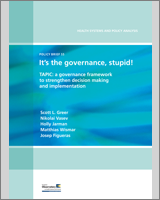NCBI Bookshelf. A service of the National Library of Medicine, National Institutes of Health.
Key messages
- Governance is a broad and complex topic with many overlapping definitions, frameworks and recommendations, but governance concepts and ideas found in the literature can broadly be grouped into five key domains: Transparency, Accountability, Participation, Integrity and Capacity (TAPIC).
- Governance is crucial to successful policy-making and implementation. It affects the likelihood that workable policies are adopted, that they are implemented, and that they produce intended results. At the same time, governance may be the cause of policy problems. But it is only one potential cause of problems, alongside other causes of failure such as inadequate finance.
- Each of the five domains of the TAPIC framework contains many different techniques for policy and procedural change. Rigorous and context-sensitive analysis is required to work out which domains contain governance problems and what those problems might be.
Contents
About the Series
Address requests about publications of the WHO Regional Office for Europe to:
Publications
WHO Regional Office for Europe
UN City, Marmorvej 51
DK-2100 Copenhagen Ø, Denmark
Alternatively, complete an online request form for documentation, health information, or for permission to quote or translate, on the Regional Office web site (http://www.euro.who.int/pubrequest).
All rights reserved. The Regional Office for Europe of the World Health Organization welcomes requests for permission to reproduce or translate its publications, in part or in full.
The designations employed and the presentation of the material in this publication do not imply the expression of any opinion whatsoever on the part of the World Health Organization concerning the legal status of any country, territory, city or area or of its authorities, or concerning the delimitation of its frontiers or boundaries.
The mention of specific companies or of certain manufacturers’ products does not imply that they are endorsed or recommended by the World Health Organization in preference to others of a similar nature that are not mentioned. Errors and omissions excepted, the names of proprietary products are distinguished by initial capital letters.
All reasonable precautions have been taken by the World Health Organization to verify the information contained in this publication. However, the published material is being distributed without warranty of any kind, either express or implied. The responsibility for the interpretation and use of the material lies with the reader. In no event shall the World Health Organization be liable for damages arising from its use. The views expressed by authors, editors, or expert groups do not necessarily represent the decisions or the stated policy of the World Health Organization.
This policy brief is one of a new series to meet the needs of policy-makers and health system managers. The aim is to develop key messages to support evidence-informed policy-making and the editors will continue to strengthen the series by working with authors to improve the consideration given to policy options and implementation.
Box
What is a Policy Brief?
- NLM CatalogRelated NLM Catalog Entries
- It’s the governance, stupid!It’s the governance, stupid!
Your browsing activity is empty.
Activity recording is turned off.
See more...
